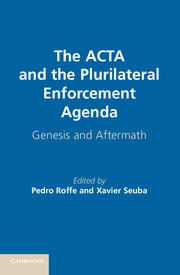Book contents
- Frontmatter
- Contents
- List of Contributors
- Foreword
- Acknowledgments
- Acronyms
- Introduction
- PART I THE FINAL ACT: ITS MAIN FEATURES AND CONTENTS
- PART II DOMESTIC LEGISLATIVE CHALLENGES
- PART III IMPACT ON RELATED PROCESSES
- PART IV VIEWS FROM STAKEHOLDERS: LESSONS
- PART V WHAT LIES AHEAD ACTA
- 21 Assessing the Implications of ACTA for the European Union
- 22 ACTA
- 23 What Was Left Out of ACTA
- 24 Slaying the ACTA Myths
- 25 Developing Countries and the Contestation of ACTA at the TRIPS Council
- 26 ACTA: What Lessons for Future Plurilateral Trade Agreements?
- Annex I Anti-Counterfeiting Trade Agreement
- References
- Index
- References
25 - Developing Countries and the Contestation of ACTA at the TRIPS Council
Published online by Cambridge University Press: 05 December 2014
- Frontmatter
- Contents
- List of Contributors
- Foreword
- Acknowledgments
- Acronyms
- Introduction
- PART I THE FINAL ACT: ITS MAIN FEATURES AND CONTENTS
- PART II DOMESTIC LEGISLATIVE CHALLENGES
- PART III IMPACT ON RELATED PROCESSES
- PART IV VIEWS FROM STAKEHOLDERS: LESSONS
- PART V WHAT LIES AHEAD ACTA
- 21 Assessing the Implications of ACTA for the European Union
- 22 ACTA
- 23 What Was Left Out of ACTA
- 24 Slaying the ACTA Myths
- 25 Developing Countries and the Contestation of ACTA at the TRIPS Council
- 26 ACTA: What Lessons for Future Plurilateral Trade Agreements?
- Annex I Anti-Counterfeiting Trade Agreement
- References
- Index
- References
Summary
Introduction
Developing countries set an important precedent in their contestation of ACTA, which has gone relatively unnoticed. For the first time, they have formally questioned at the WTO an entire plurilateral agreement containing TRIPS-plus obligations negotiated and concluded outside the organization. While many developing countries have had concerns about TRIPS-plus standards in regional and bilateral trade agreements for several years, never have such concerns been so forcefully articulated from the point of view of their “systemic” implications for the TRIPS Agreement and the WTO. The use of the TRIPS Council as a platform for such contestation is also rather remarkable and unprecedented.
In this context, this chapter examines the positions of developing countries, particularly emerging economies, towards ACTA at the WTO TRIPS Council and how they evolved in a short time period towards open defiance. While there has been extensive analysis of concerns amongst developing countries regarding specific provisions in ACTA, there has been relatively less attention to their concerns about the Agreement’s systemic implications, as well as the broader dynamics of their significance for the international intellectual property (IP) system.
While developing countries were ultimately not behind the coup de gr â ce that led to ACTA’s de facto political demise, their hostility towards it certainly contributed to that outcome, amidst a growing opposition movement arising from different quarters. At the same time, the responses of developing countries to ACTA illustrate some of the limitations and weaknesses they face in addressing such initiatives at the international level.
- Type
- Chapter
- Information
- The ACTA and the Plurilateral Enforcement AgendaGenesis and Aftermath, pp. 357 - 375Publisher: Cambridge University PressPrint publication year: 2014
References
- 1
- Cited by

